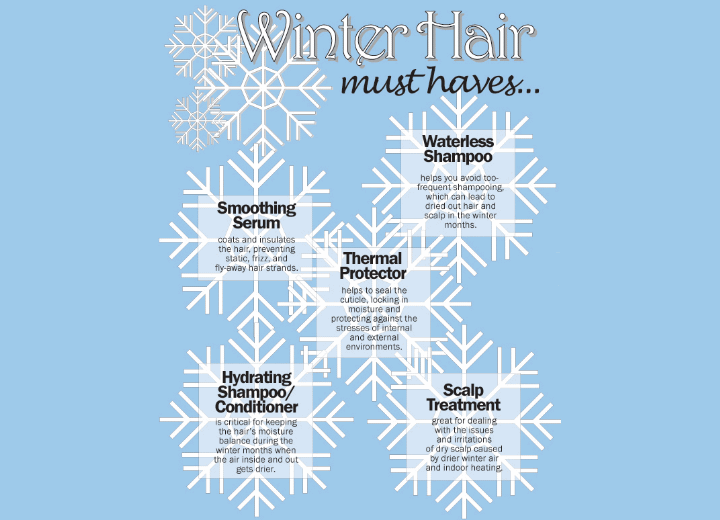Winter Hair Product Must-Haves

We all know that winter weather brings with it a whole host of problems for the hair. The change in temperature and humidity when transitioning from indoors to outdoors (and vice versa) can strip the hair of moisture, leaving it dry and flyaway.
This problem gets compounded when adding in the static build-up caused by fibers in sweaters and overcoats, as well as walking across carpeted floors when the air is heavily charged with negative ions.
Dry/Waterless Shampoo
In harsh winter weather, it is often helpful to avoid washing your hair every day. However, many people have difficulty going without daily shampooing. This is where waterless shampoo comes in.
Whether you choose the liquid formula that requires no water for rinsing or the sprays and powders that are applied and then brushed out, waterless shampoo can help you deal with the oily scalp issues that often arise between shampoos.
Smoothing Serum
One of the most frequently mentioned issues during winter for many of my clients is frizz and static caused by cold weather. This can be due to winter wear, such as woolen scarves and hats, or simply the dry and cold air in various locations. However, the outcome is always the same: the hair puffs out and gets frizzed and statically charged.
Smoothing serum can help with this issue by coating the hair shaft and preventing the accumulation of static charges in the hair. You can also enhance the effect by using an additional mist of hairspray to insulate the hair further.

Dry scalp and itching are other common complaints during the winter months. To address the issue, it is beneficial to have a scalp treatment on hand. Whether you prefer a product containing fruit oils, tea-tree oil, or other herbal remedies, a moisture-rich scalp treatment can keep the scalp moisturized, itch-free, and flake-free.
You can even integrate the scalp treatment into your regular routine by using a dry scalp shampoo. Many people experience dry, itchy scalp during the winter months and assume that it is dandruff when it is merely due to dry scalp.
Hydrating Shampoo and Conditioner
Believe it or not, the need for moisturizing shampoo and conditioner is higher during winter months than in summer. As heated air tends to be dry, and so is very cold air, your hair and scalp are likely to dry out more in the winter than in summer. Therefore, you need to replenish this moisture to avoid the need for some of the other products mentioned here. There is no set rule for brands that work best. Simply choose a brand that you are comfortable with and look for a formula designed to moisturize the hair and scalp.
If you encounter specific problems with moisture loss during the winter months, try using a deep conditioning treatment. An affordable and straightforward deep conditioner is Cholesterol. This is a fatty cream that hydrates and moisturizes the hair. It is not recommended for very fine hair, but for hair types that are dry and frizzy in winter (such as coarse hair, very curly hair, or very thick hair), you can apply the cholesterol cream liberally to the hair, massage it in, comb it through, and let it sit on the hair for fifteen to twenty minutes. You can then shampoo the hair as usual (it may require a few shampoos) to remove the excess product, but you'll find that your hair is saturated and shiny.
Thermal Protector
Finally, whether you do a lot of thermal styling or not, using a good thermal protector on your hair during the winter can help prevent a lot of the damage and problems caused by the climate changes when you go from outdoors to indoors in winter. These thermal protectors coat the hair and insulate it, sealing in the moisture and helping the hair resist the damage from cold air as well as acting as an emollient to prevent the hair from getting and feeling brittle.
Again, the specific product brand isn't as important as making sure it works for your hair type. Those who have fine hair should look for a lighter formula, while those with coarse and thick hair may want a heavier, more insulating product.
©Hairfinder.com
See also:
Winter hair care advice
How to get rid of static hair in winter
What makes hair break more in the fall and winter?